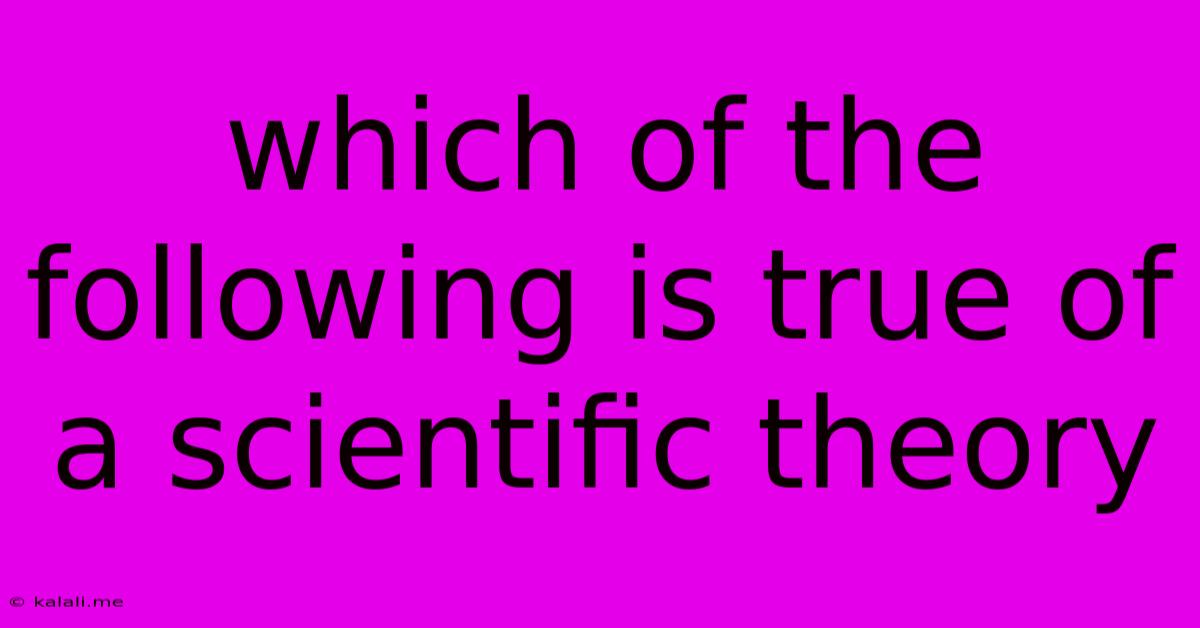Which Of The Following Is True Of A Scientific Theory
Kalali
Jun 13, 2025 · 3 min read

Table of Contents
Which of the Following is True of a Scientific Theory? Unraveling the Misconceptions
Many people misunderstand the term "scientific theory." In everyday conversation, "theory" often implies a guess or hunch. However, in science, a theory holds a much more significant and robust meaning. This article will clarify the true nature of a scientific theory and dispel common misconceptions. We'll explore what distinguishes a scientific theory from a hypothesis and everyday speculation, highlighting its power and predictive capabilities.
A scientific theory is not simply a guess or a wild idea; it's a well-substantiated explanation of some aspect of the natural world that can incorporate facts, laws, inferences, and tested hypotheses. It's a comprehensive framework supported by a vast body of evidence. Let's explore the key characteristics that define a scientific theory:
Key Characteristics of a Scientific Theory:
-
Extensive Evidence-Based: A scientific theory isn't built on a single experiment or observation. Instead, it's supported by a large and consistent body of evidence gathered over time through numerous experiments, observations, and data analysis. This evidence must be repeatable and verifiable by other scientists. Think of the theory of evolution by natural selection – its validity is supported by evidence from genetics, paleontology, comparative anatomy, and many other fields.
-
Explanatory Power: A strong scientific theory goes beyond simply describing observations; it explains why those observations occur. It provides a coherent and unifying framework to understand a complex phenomenon. For example, the germ theory of disease not only describes the presence of microorganisms in sick individuals but explains how these organisms cause illness.
-
Predictive Capability: A robust scientific theory can make accurate predictions about future observations or experiments. These predictions can be tested, providing further support or requiring refinement of the theory. For instance, the theory of gravity accurately predicts the trajectory of projectiles and the orbits of planets.
-
Testable and Falsifiable: Crucially, a scientific theory must be testable. This means that it must be possible to design experiments or observations that could potentially disprove it (falsifiability). If a theory cannot be tested or falsified, it is not considered a scientific theory.
-
Subject to Revision: Scientific theories are not static; they are constantly evaluated and refined in light of new evidence. As new data emerges, theories may be modified, extended, or even replaced by more comprehensive and accurate models. This process of refinement is a hallmark of scientific progress.
Distinguishing a Theory from a Hypothesis:
A hypothesis is a specific, testable prediction about a phenomenon. It's a tentative explanation that can be investigated through experimentation. Think of a hypothesis as a building block for a theory. Many confirmed hypotheses, along with supporting evidence, contribute to the development of a scientific theory.
Common Misconceptions about Scientific Theories:
-
"It's just a theory": This phrase often diminishes the significance of a scientific theory. As we've seen, a scientific theory represents a well-established explanation, not mere speculation.
-
"Theories become laws": Scientific theories and laws serve different purposes. Laws describe what happens under certain conditions (e.g., the law of gravity), while theories explain why those things happen. They are not interchangeable.
-
"Theories are proven": Scientific theories are not "proven" in the absolute sense. Instead, they are supported by overwhelming evidence and have withstood rigorous testing. The possibility of new evidence challenging or modifying a theory always remains.
In conclusion, a scientific theory is a powerful and robust explanation of the natural world, built upon a foundation of evidence, predictive power, and rigorous testing. Understanding the true nature of a scientific theory is crucial for comprehending the scientific method and the ever-evolving landscape of scientific knowledge.
Latest Posts
Latest Posts
-
Which Of The Following Is True About The Gdp Deflator
Jun 14, 2025
-
Who Is Considered The Father Of The Computer
Jun 14, 2025
-
Newtons Second Law Questions And Answers Pdf
Jun 14, 2025
-
At What Temperature Does Water Freeze In Fahrenheit
Jun 14, 2025
-
The Art Of Effective Or Persuasive Speaking Or Writing
Jun 14, 2025
Related Post
Thank you for visiting our website which covers about Which Of The Following Is True Of A Scientific Theory . We hope the information provided has been useful to you. Feel free to contact us if you have any questions or need further assistance. See you next time and don't miss to bookmark.